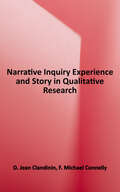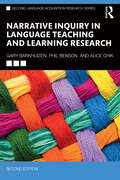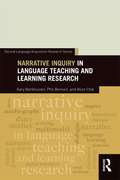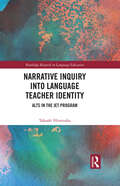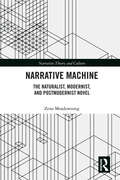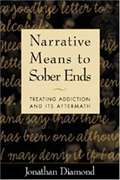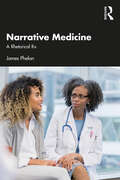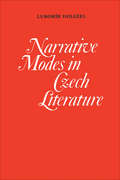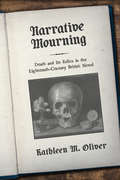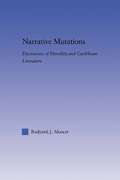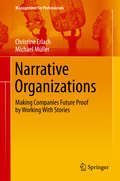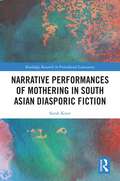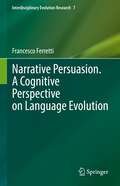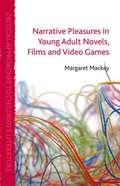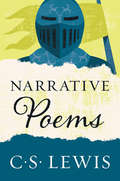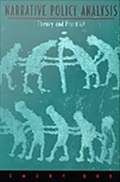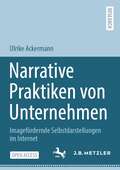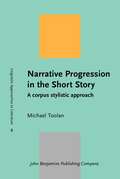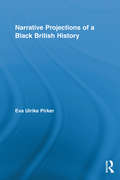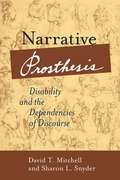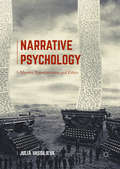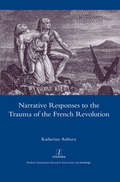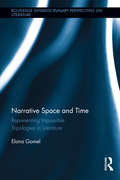- Table View
- List View
Narrative Innovation and Incoherence: Ideology in Defoe, Goldsmith, Austen, Eliot, and Hemingway
by Michael M. BoardmanWhen the impulse toward innovation arises late in a writer's career, it is often accompanied by a sense of urgency, and the result, as Narrative Innovation and Incoherence demonstrates, raises important questions for literary theory. Michael M. Boardman considers this pressing struggle to find a new form as it appears in the later works of Defoe, Goldsmith, Austen, Eliot, and Hemingway. He analyzes how these authors react to new and compelling beliefs for which a previous way of writing is no longer adequate.Urgent innovations, in this account, can only be understood as unique, individual responses to crises in belief. Taking as a point of departure French theorist Althusser's conviction that ideology is intelligible only through structure, Boardman searches for an explanation of both form and ideology not in Marxist concepts of base and superstructure but in the particular structure of an individual artist's writing career. Narrative ideology here becomes more complex than is generally assumed.Theoretically informed yet avoiding essentializing explanations of narrative invention, Narrative Innovation and Incoherence offers unexpected insights into the multifaceted relations between form and belief. It will encourage serious students of the novel to reexamine the importance of poetics as a mediating factor in the means of production.
Narrative Inquiry Experience and Story in Qualitative Research: Experience And Story In Qualitative Research
by D. Jean Clandinin F. Michael Connelly"The literature on narrative inquiry has been, until now, widely scattered and theoretically incomplete. Clandinin and Connelly have created a major tour de force. This book is lucid, fluid, beautifully argued, and rich in examples. Students will find a wealth of arguments to support their research, and teaching faculty will find everything they need to teach narrative inquiry theory and methods."--Yvonna S. Lincoln, professor, Department of Educational Administration, Texas A+M University. Understanding experience as lived and told stories--also known as narrative inquiry--has gained popularity and credence in qualitative research. Unlike more traditional methods, narrative inquiry successfully captures personal and human dimensions that cannot be quantified into dry facts and numerical data. In this definitive guide, Jean Clandinin and Michael Connelly draw from more than twenty years of field experience to show how narrative inquiry can be used in educational and social science research. Tracing the origins of narrative inquiry in the social sciences, they offer new and practical ideas for conducting fieldwork, composing field notes, and conveying research results. Throughout the book, stories and examples reveal a wide range of narrative methods. Engaging and easy to read, Narrative Inquiry is a practical resource from experts who have long pioneered the use of narrative in qualitative research.
Narrative Inquiry in Language Teaching and Learning Research (ISSN)
by Phil Benson Alice Chik Gary BarkhuizenNarrative Inquiry in Language Teaching and Learning Research is the only entry-level introduction to research methods using stories, either as data or as a means of presenting findings, and a practical guide for those interested in carrying out narrative studies.This successful text is grounded in published empirical research within the field of language teaching and learning and clearly defines basic concepts in narrative inquiry, explaining how and why narrative methods have been used in language teaching and learning research and outlining different choices and approaches. It also examines the different ways of eliciting, analyzing, and presenting narrative inquiry data, which offers exciting prospects for language teaching and learning research. This second edition has been fully revised and updated to reflect the latest research and includes new sections on multimodal digital narrative research and the reporting of findings in dissertations and theses.This original and well-respected textbook is an ideal course book for specialist courses on narrative inquiry in language teaching and learning. It is an excellent entry-level text for undergraduate students preparing honours projects, postgraduate masters’ and doctoral students embarking on narrative projects, and more advanced researchers seeking to understand the role of narrative inquiry in language teaching and learning research. It is also the go-to choice as a reference on narrative in more general applied linguistics research methodology courses.
Narrative Inquiry in Language Teaching and Learning Research: Narrative Inquiry In Language Teaching And Learning Research (Second Language Acquisition Research Series)
by Phil Benson Alice Chik Gary BarkhuizenNarrative Inquiry in Language Teaching and Learning Research provides an entry-level introduction to research methods using stories, as data or as a means of presenting findings, that is grounded in published empirical research within the field of language teaching and learning. It discusses basic definitions and concepts in narrative inquiry, explains how and why narrative methods have been used in language teaching and learning research, and outlines the different approaches and topics covered by this research. It also examines the different ways of eliciting, analyzing, and presenting narrative inquiry data.Narrative inquiry offers exciting prospects for language teaching and learning research and this book is the first focused and practical guide for readers who are interested in understanding or carrying out narrative studies.
Narrative Inquiry into Language Teacher Identity: ALTs in the JET Program (Routledge Research in Language Education)
by Takaaki HiratsukaThis book provides insights for both native language teachers and local language teachers alike who conduct team-taught lessons by revisiting the topic of foreign assistant language teachers (ALTs), the Japan Exchange and Teaching (JET) program, and team teaching. This book is innovative in that (a) it is the first to elucidate ALTs’ experiences comprehensively, across both historical time (i.e., prior to, during, and after the JET program) and social space (i.e., inside and outside the school), thereby revealing their multiple identities that they come to construct and reconstruct over time, and (b) it explores the meanings and perspectives of particular phenomena that ALTs experience within their specific social settings from their own individual points of view. This inquiry does this by using personal narrative accounts gathered from multiple participants. Through these narrative accounts, Hiratsuka formulates a conceptualization of ALT identity, an effort that has hitherto been neglected. As a consequence, this book offers several practical and empirical applications of the conceptualization to future endeavors involving native language teachers and those who engage with them, including the key stakeholders of local language teachers, their local boards of education, the governments, and language learners across the globe.
Narrative Machine: The Naturalist, Modernist, and Postmodernist Novel (Narrative Theory and Culture)
by Zena MeadowsongNarrative Machine: The Naturalist, Modernist, and Postmodernist Novel advances a new history of the novel, identifying a crucial link between narrative innovation and the historical process of mechanization. In the late nineteenth century, the novel grapples with a new and increasingly acute problem: In its attempt to represent the colossal power of modern machinery—the steam-driven machines of the Industrial Revolution, the electrical machines of the modern city, and the atomic and digital machines developed after the Second World War—it encounters the limitations of traditional representative strategies. Beginning in the naturalist novel, the machine is typically portrayed as a mythic monster, and though that monster represents a potentially horrific reality—the superhuman power of mechanization—it also disrupts the documentary objectives of narrative realism (the dominant mode of nineteenth-century fiction). The mechanical monster, realistic and yet at odds with traditional realist strategies, tears the form of the novel apart. In doing so, it unleashes a series of innovations that disclose, critique, and contest the force of mechanization: the innovations associated with literary naturalism, modernism, and postmodernism.
Narrative Means to Sober Ends: Treating Addiction and Its Aftermath
by Jonathan Diamond David C. TreadwayProposes a narrative approach that builds a bridge between family therapy, psychodynamic therapy, and addictions counseling. Demonstrates innovative ways to help clients form new understandings of the events of their lives, explore their relationships to drugs and alcohol, and develop new stories to nourish their recovery. Central to this approach is the use of letter writing, personal accounts, and other creative tasks. Diamond has been teaching and training in the fields of addiction and psychotherapy for the past 15 years. He is currently in private practice. Annotation c. Book News, Inc., Portland, OR (booknews.com)
Narrative Medicine: A Rhetorical Rx
by James PhelanNarrative Medicine: A Rhetorical Rx rests on the principles that storytelling is central to medical encounters between caregivers and patients and that narrative competence enhances medical competence. Thus, the book's goal is to develop the narrative competence of its reader. Grounded in the rhetorical theory of narrative that Phelan has been constructing over the course of his career, this volume utilizes a three-step method: Offering a jargon-free explication of core concepts of narrative such as character, progression, perspective, time, and space. Demonstrating how to use those concepts to interpret a diverse group of medical narratives, including two graphic memoirs. Pointing to the relevance of those demonstrations for caregiver-patient interactions. Narrative Medicine: A Rhetorical Rx is the ideal volume for undergraduate students interested in pursuing careers in healthcare, students in medical and allied health professional schools, and graduate students in the health humanities and social sciences.
Narrative Modes in Czech Literature
by Lubomir DolezelIn this study of the study of the linguistic approach to narrative structures, the author examines the question of point of view in fiction, drawing examples from Czech literature. He applies the methods of structural linguistics and literary studies as developed by the Prague Linguistic School, and the modern methodology of semiotics and text theory. This approach, widely used in Czechoslovakia and elsewhere in Europe, is not as well known as it should be in the English-speaking world. The essays may be read without any knowledge of the Czech language or Czech literary history. All Czech examples and materials are translated into English, preserving traits of the original texts which are relevant for structural analysis; the original Czech of all examples appears in an appendix. While the examples serve as documentation for theoretical statements, they also serve to familiarize the English-speaking reader with some of the major works of Czech fiction, especially those of Komenský (Comenius), Rais Ĉapek, Vanĉura, Pujmanová, Olbrachtm and Kundera. These works demonstrate the continuous bond between Czech fiction and European literary traditions, and offer original and profound insights into the cultural, social, and political experience of the Czech nation. Of particular interest to specialists in Slavic studies, general linguistics, poetics and text theory, and to students of general and comparative literature, Narrative Modes in Czech Literature deals with a significant problem of poetics and makes an original, constructive contribution to the theory of literature in the English language.
Narrative Mourning: Death and Its Relics in the Eighteenth-Century British Novel (Transits: Literature, Thought & Culture 1650-1850)
by Kathleen M. OliverNarrative Mourning explores death and its relics as they appear within the confines of the eighteenth-century British novel. It argues that the cultural disappearance of the dead/dying body and the introduction of consciousness as humanity’s newfound soul found expression in fictional representations of the relic (object) or relict (person). In the six novels examined in this monograph—Samuel Richardson's Clarissa and Sir Charles Grandison; Sarah Fielding's David Simple and Volume the Last; Henry Mackenzie's The Man of Feeling; and Ann Radcliffe's The Mysteries of Udolpho—the appearance of the relic/relict signals narrative mourning and expresses (often obliquely) changing cultural attitudes toward the dead. Published by Bucknell University Press. Distributed worldwide by Rutgers University Press.
Narrative Mutations: Discourses of Heredity and Caribbean Literature (Literary Criticism and Cultural Theory)
by Rudyard AlcocerGiven the welcomed shift throughout the academy away from essentialist and biologically fixed understandings of "race" and the body, it is a curiosity worth exploring that so many sophisticated-and even radical-narratives retain physical and behavioral heredity as a guiding trope. The persistence of this concept in Caribbean literature informs not only discourses on race, ethnicity, and sexuality, but also conceptions of personal and regional identity in a postcolonial societies once dominated by slavery and the plantation. In this book, Rudyard Alcocer offers a theory of Caribbean narrative, accounting for the complex interactions between scientific and literary discourses while expanding the horizons of narrative studies in general. Covering works from Jean Rhys's Wide Sargasso Sea through contemporary fiction from the Hispanic Caribbean, Narrative Mutations analyzes the processes and concepts associated with heredity in exploring what it means to be "Caribbean."
Narrative Organizations: Making Companies Future Proof by Working With Stories (Management for Professionals)
by Michael Müller Christine ErlachThis book shows how to work with stories and narrative approaches in almost all fields of action of a company, and demonstrates the added value resulting from a holistic narrative perspective. The authors take thereby a practice-based perspective from the viewpoint of managing directors, the C-suite, organizational developers, corporate communicators and advisers with a rich description of the methods and implementation.By the employment of these narrative methods, leadership styles, communication, knowledge and change management can be planned in such a way that on the one hand the identity-core of the enterprise remains always apparent and on the other, the organization can develop in an agile fashion into the future.
Narrative Performances of Mothering in South Asian Diasporic Fiction (Routledge Research in Postcolonial Literatures)
by Sarah KnorExamining a range of South Asian Anglophone diasporic fiction and poetry, this monograph opens a new dialogue between diaspora studies and gender studies. It shows how discourses of diaspora benefit from re-examining their own critical relation to concepts of the maternal and the motherland. Rather than considering maternity as a fixed or naturally given category, it challenges essentialist conceptions and explores mothering as a performative practice which actively produces discursive meaning. This innovative approach also involves an investigation of central metaphors in nationalist and diasporic rhetorics, bringing critical attention to the strategies they employ and the unique aesthetic forms they produce.
Narrative Persuasion. A Cognitive Perspective on Language Evolution (Interdisciplinary Evolution Research #7)
by Francesco FerrettiThis book explores the evolutionary and cognitive foundations of human communication, focusing on narrative as its distinctive dimension. Within a framework of continuity with both the communication of our hominin predecessors and that of non-human animals, the book is about a twofold proposal. It includes the idea that (human and animal) communication has an intrinsically persuasive nature along with the hypothesis that humans developed narrative forms of communication in order to enhance their persuasive abilities. In this view, narrative persuasion becomes the feature that distinguishes human communication from animal communication. The study of the transition from animal communication to language addresses both the selective pressures that led communication for persuasive purposes to take a narrative form and the cognitive architectures and expressive systems that enabled our ancestors to cope with the selective pressures of persuasive/narrative-based communication. Language evolution is interdisciplinary, even from the specific perspective of evolutionary pragmatics chosen here. Therefore, this book is intended for researchers working in fields such as cognitive sciences, philosophy, evolutionary biology, cognitive psychology, and primatology. It also represents a valuable resource for advanced students in cognitive sciences, linguistics, and philosophy.
Narrative Pleasures in Young Adult Novels, Films, and Video Games
by Margaret MackeyStories are told today through many formats and young interpreters bring multimedia experience to bear on every narrative format they encounter. In this book, twelve young people read a novel, watch a film and play a video game from beginning to end. Their responses inform a new framework of contemporary themes of narrative comprehension.
Narrative Poems
by C. S. LewisA repackaged edition of the revered author’s collection of four poems: "Dymer," "Launcelot," "The Nameless Isle," and "The Queen of Drum."C. S. Lewis—the great British writer, scholar, lay theologian, broadcaster, Christian apologist, and author of Mere Christianity, The Screwtape Letters, The Great Divorce, The Chronicles of Narnia, and many other beloved classics—was also a talented poet. In this collection of four longer works of verse, Lewis displays his deep love for medieval and Renaissance poetry and themes, influences that shaped—and resonate through—his fiction.
Narrative Policy Analysis
by Practice TheoryNarrative Policy Analysis presents a powerful and original application of contemporary literary theory and policy analysis to many of today's most urgent public policy issues. Emery Roe demonstrates across a wide array of case studies that structuralist and poststructuralist theories of narrative are exceptionally useful in evaluating difficult policy problems, understanding their implications, and in making effective policy recommendations. Assuming no prior knowledge of literary theory, Roe introduces the theoretical concepts and terminology from literary analysis through an examination of the budget crises of national governments. With a focus on several particularly intractable issues in the areas of the environment, science, and technology, he then develops the methodology of narrative policy analysis by showing how conflicting policy "stories" often tell a more policy-relevant meta-narrative. He shows the advantage of this approach to reading and analyzing stories by examining the ways in which the views of participants unfold and are told in representative case studies involving the California Medfly crisis, toxic irrigation in the San Joaquin Valley, global warming, animal rights, the controversy over the burial remains of Native Americans, and Third World development strategies. Presenting a bold innovation in the interdisciplinary methodology of the policy sciences, Narrative Policy Analysis brings the social sciences and humanities together to better address real-world problems of public policy--particularly those issues characterized by extreme uncertainty, complexity, and polarization--which, if not more effectively managed now, will plague us well into the next century.
Narrative Praktiken von Unternehmen: Imagefördernde Selbstdarstellungen im Internet
by Ulrike AckermannDiese Open-Access-Publikation befasst sich mit dem Erzählen im Unternehmenskontext, was spätestens seit der Einführung des Storytelling in den 1999er-Jahren allgegenwärtig ist. Der Band zeigt in diesem Zusammenhang, wie Unternehmen das Erzählen explizit im Internet nutzen, um sich nach außen positiv darzustellen (= Imageförderung). In der Veröffentlichung wird deutlich, dass für die (Selbst)Darstellung bestimme Spezifika von Erzählungen von besonderer Bedeutung sind. Mit ihrer Hilfe können Unternehmen bspw. Konzepte – wie Corporate Responsibility – als gelebte Werte den Zielgruppen diskret veranschaulichen oder den Arbeitsalltag zu einem besonderen Erlebnis stilisieren. Insgesamt identifiziert die Autorin vier Grundtypen der (Selbst)Darstellung mit jeweils spezifisch narrativer Rhetorik sowie bezeichnende narrative Realisierungsformen, um diese Typen im WWW an die gewünschten Zielgruppen zu kommunizieren. Hierbei zeichnen sich die sprachwissenschaftlich analysierten Erkenntnisse durch ihre interdisziplinäre Einbettung aus. Dadurch eröffnen sich Anschlussmöglichkeiten zu anderen Fachdisziplinen.
Narrative Progression in the Short Story: A corpus stylistic approach
by Michael ToolanOne of our most valuable capacities is our ability partly to predict what will come next in a text. But linguistic understanding of this remains very limited, especially in genres such as the short story where there is a staging of the clash between predictability and unpredictability. This book proposes that a matrix of narrativity-furthering textual features is crucial to the reader’s forming of expectations about how a literary story will continue to its close. Toolan uses corpus linguistic software and methods, and stylistic and narratological theory, in the course of delineating the matrix of eight parameters that he sees as crucial to creating narrative progression and expectation. The book will be of interest to stylisticians, narratologists, corpus linguists, and short story scholars.
Narrative Projections of a Black British History (Routledge Approaches to History)
by Eva Ulrike PirkerSince the mid-1990s, the black experience in Britain has begun to be (re)negotiated intensely, with a strong focus on history. Narrative Projections of a Black British History considers narratives that construct, or engage with, aspects of a black British history. Part I poses the question of what sort of narratives have emerged from, and in turn determine, key events (such as the iconic 'Windrush' moment) and developments and provides basic insights into theoretical frameworks. It also offers a large number of comparative readings, considering both 'factual' and 'fictional' forms of representation such as history books, documentary films, life writing, novels, and drama, and identifies main strands, 'official' narratives and countercurrents. Part II embarks on close readings and analyses of a selection of narratives that can be classed as reactions to the 'established' historical culture. Overall, the book draws attention to collective currents and individual positions, affirmative and critical approaches: Together, they form a representative image of a specific moment in the ongoing debate about a black British history.
Narrative Prosthesis: Disability and the Dependencies of Discourse
by David T. Mitchell Sharon L. SnyderNarrative Prosthesis: Disability and the Dependencies of Discourse develops a narrative theory of the pervasive use of disability as a device of characterization in literature and film. It argues that, while other marginalized identities have suffered cultural exclusion due to a dearth of images reflecting their experience, the marginality of disabled people has occurred in the midst of the perpetual circulation of images of disability in print and visual media. The manuscript's six chapters offer comparative readings of key texts in the history of disability representation, including the tin soldier and lame Oedipus, Montaigne's "infinities of forms" and Nietzsche's "higher men," the performance history of Shakespeare's Richard III, Melville's Captain Ahab, the small town grotesques of Sherwood Anderson's Winesburg, Ohio and Katherine Dunn's self-induced freaks in Geek Love. David T. Mitchell is Associate Professor of Literature and Cultural Studies, Northern Michigan University. Sharon L. Snyder is Assistant Professor of Film and Literature, Northern Michigan University.
Narrative Psychology
by Julia VassilievaThis book provides the first comparative analysis of thethree major streams of contemporary narrative psychology as they have beendeveloped in North America, Europe, and Australia and New Zealand. Interrogating the historical and cultural conditions in which this importantmovement in psychology has emerged, the book presents clear, well-structuredcomparisons and critique of the key theories of narrative psychology pioneeredacross the globe. Examples include Dan McAdams in the US and his followers, whohave developed a distinctive approach to self and identity as a life story overthe past two decades; in the Netherlands by Hubert Hermans, whose research onthe 'dialogical self' has made the University of Nijmegen a centre of narrativepsychological research in Europe; and in Australia and New Zealand, where thecollaborative efforts of Michael White and David Epston helped to launch thenarrative movement in psychotherapy in the late 1980s.
Narrative Pulse of Beowulf
by John M HillOne of the most consistent critiques levelled against Beowulf is that it lacks a steady narrative advance and that its numerous digressions tend to complicate if not halt the poem's movement. As those passages often look backward or far ahead in narrative time, they seem to transform the poem into a meditative pastiche. The Narrative Pulse of Beowulf counters this assertion, examining Beowulf as a social drama with a strong, forward-moving narrative momentum.John M. Hill discerns a distinctive 'narrative pulse' arising out of the poem's many scenes of arrival and departure. He argues that such scenes, far from being fixed or 'type' scenes, are socially dramatic and a key to understanding the structural density of the poem. Bolstering his analysis with a strong understanding of the epic, Hill looks at Beowulf in relation to other stories such as The Odyssey and The Iliad, epics that, though they may appear to have a certain narrative elasticity, use scenes of arrival and departure to create a cohesive social world in which stories unfold. As a new and comprehensive study of one of the most important Old English texts, The Narrative Pulse of Beowulf sheds new light on this famous poem and the epic tradition itself.
Narrative Responses to the Trauma of the French Revolution
by Katherine AstburyDuring the French Revolution, traditional literary forms such as the sentimental novel and the moral tale dominate literary production. At first glance, it might seem that these texts are unaffected by the upheavals in France; in fact they reveal not only a surprising engagement with politics but also an internalised emotional response to the turbulence of the period. In this innovative and wide-ranging study, Katherine Astbury uses trauma theory as a way of exploring the apparent contradiction between the proliferation of non-political literary texts and the events of the Revolution. Through the narratives of established bestselling literary figures of the Ancien Regime (primarily Marmontel, Madame de Genlis and Florian), and the early works of first generation Romantics Madame de Stael and Chateaubriand, she traces how the Revolution shapes their writing, providing an intriguing new angle on cultural production of the 1790s.Katherine Astbury is Senior Lecturer in French Studies at the University of Warwick.
Narrative Space and Time: Representing Impossible Topologies in Literature (Routledge Interdisciplinary Perspectives on Literature)
by Elana GomelSpace is a central topic in cultural and narrative theory today, although in most cases theory assumes Newtonian absolute space. However, the idea of a universal homogeneous space is now obsolete. Black holes, multiple dimensions, quantum entanglement, and spatio-temporal distortions of relativity have passed into culture at large. This book examines whether narrative can be used to represent these "impossible" spaces. Impossible topologies abound in ancient mythologies, from the Australian Aborigines’ "dream-time" to the multiple-layer universe of the Sumerians. More recently, from Alice’s adventures in Wonderland to contemporary science fiction’s obsession with black holes and quantum paradoxes, counter-intuitive spaces are a prominent feature of modern and postmodern narrative. With the rise and popularization of science fiction, the inventiveness and variety of impossible narrative spaces explodes. The author analyses the narrative techniques used to represent such spaces alongside their cultural significance. Each chapter connects narrative deformation of space with historical problematic of time, and demonstrates the cognitive and perceptual primacy of narrative in representing, imagining and apprehending new forms of space and time. This book offers a comprehensive analysis of the connection between narratology, cultural theory, science fiction, and studies of place.

